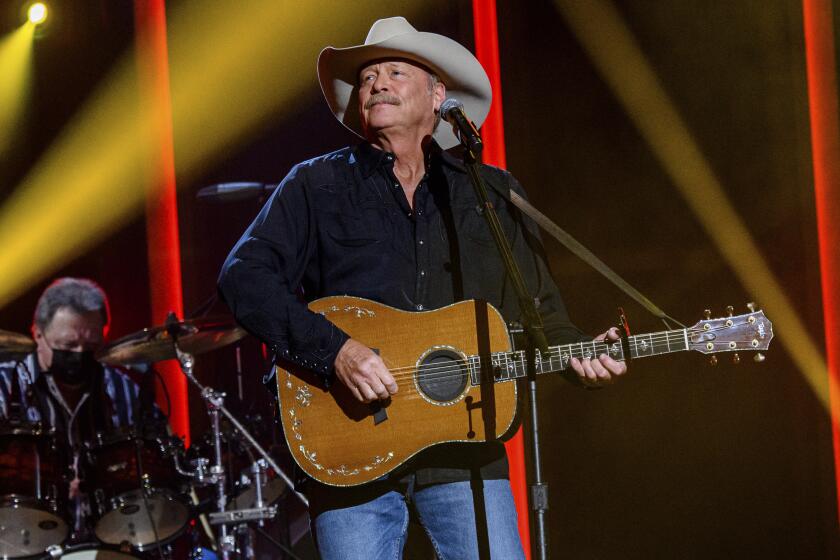Hip-Hop’s Slump: A Blip or a Trend?
- Share via
With Eminem prowling the top of the sales charts and Nelly waiting in the wings with a highly anticipated new release, it would seem that rap is as potent as ever at music stores. And there’s no doubt that hip-hop has become inseparably woven into the whole cloth of American youth culture.
So why is there a murmur of discontent beneath the beats?
Sales of hip-hop albums in the first quarter of 2002 were down an eye-opening 26% from the same period last year, by far the largest drop among major pop genres, and longtime observers on the scene have been grumbling that innovation and star power are on the wane.
There are other challenges too: Rap concerts have never matured to rival the genre’s record sales, and the music’s young fans are so enamored with fresh sounds that it has been nearly impossible for artists to create long-term relevancy.
The youth of its fans also makes hip-hop one of the ripest targets for online music theft--no other age group is as active on the Internet or as likely to feel it’s acceptable to pilfer music via downloadable files.
“I would say the health of hip-hop is down, but I would say the health of traditional prerecorded label music is down too,” said Violet Brown, the lead urban music buyer for the Wherehouse chain.
“There is a lot of burning [of homemade CDs] in hip-hop and a lot of bootlegging.... A friend of mine teaches and says flat out that 10th-, 11th- and 12th-grade kids do not buy prerecorded music; they only gets ‘boots’ that are leaked early on the [Internet] sites.”
“The Eminem Show,” the blockbuster release that will on its own buoy the genre’s second-quarter sales, was abruptly moved up on the release schedule last month after Interscope, the rapper’s record label, cited rampant trafficking of the music online and on street corners.
But even with all that, the sharp decline in first-quarter rap sales charted by the Nielsen SoundScan tracking service may have more deeply rooted causes.
“Business has been bad overall, but a lot of the rock releases are doing extremely well,” Brown said. “That’s part of what’s going on. The same customers who buy rock-rap buy rap. They are definitely sharing the same consumer.”
Consumer surveys show that the majority of rap album buyers are suburban white males in their teens. And a significant chunk of that base has turned in the past few years to guitar-driven bands that tap into hip-hop beats and rap-style vocals, often with an aggressive sonic presence. Rage Against the Machine may have made the template for the sound, but Limp Bizkit and Korn were the bands that made it an MTV-friendly music sensation.
Hip-hop is no afterthought, of course. The Recording Industry Assn. of America’s survey of 2001 sales showed that rap and hip-hop accounted for 11.4% of all U.S. music releases shipped by the industry in 2001, its second-highest percentage in a decade and trailing only rock releases (24.4% of all shipments) and pop (12.1%).
No one expects rap or hip-hop to disappear, but is it in danger of losing the vibrancy that has made it the most exciting real estate on the pop music landscape in the past 20 years? The sharp first-quarter sales decline might be explained away by a lack of high-profile releases, but some observers say the genre may also have a drought of true superstars.
Eminem has ascended to a stratum of his own, Jay-Z remains a powerhouse (the disappointing sales of his recent “Best of Both Worlds” seem due to the controversy surrounding his collaborator on the album, R&B; singer R. Kelly) and OutKast has been able to meld critical acclaim with platinum sales, but after that there are questions about the longevity and heft of the genre’s other young artists.
“I don’t see the new stars pushing things forward, not like the generations before them,” esteemed rap video director Hype Williams said. “I wish I did.”
Some observers point to the deaths of superstars such as 2Pac and the Notorious B.I.G., but others blame the genre’s culture of cash competition and the narrow thematic focus of hard-core street rap; the former pushes toward the predictable mainstream where wide audiences can be found, while the latter creates a repetitious revisiting of topics that rarely feels fresh or edgy anymore.
Lyor Cohen, chairman of Island Def Jam Recordings, has been a player in the rap world since its 1980s growth from sidewalk sensation to pop-culture force. He sees the first-quarter sales decline as a statistical blip on the screen, but he does sense that hip-hop is doing some soul-searching.
Just as rock ‘n’ roll went from an unpredictable, grass-roots sensation in the 1950s to a political force in the ‘60s to a corporate-informed existence in the ‘70s, hip-hop finds itself two decades old and feeling the tugs of art and commerce.
“The barrier for rap music is starting to become much smaller, there is access now to pop culture media that wasn’t there before and that has changed the art itself,” Cohen said. “The controversial becomes a different type of controversial....
“Now all the gatekeepers that once said rap was vulgar and not musical, their kids want Jay-Z’s autograph and Ja Rule’s autograph. So now the gatekeepers give hip-hop access and the entrepreneurial rappers are on the inside, not the outside.
“Hip-hop has to figure out how to handle that. And I have no doubt that it will.”
More to Read
The biggest entertainment stories
Get our big stories about Hollywood, film, television, music, arts, culture and more right in your inbox as soon as they publish.
You may occasionally receive promotional content from the Los Angeles Times.










